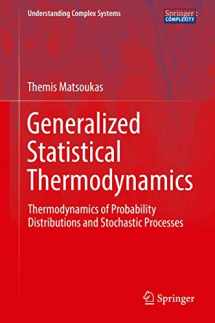
Generalized Statistical Thermodynamics: Thermodynamics of Probability Distributions and Stochastic Processes (Understanding Complex Systems)
Book details
Summary
Description
This book gives the definitive mathematical answer to what thermodynamics really is: a variational calculus applied to probability distributions. Extending Gibbs's notion of ensemble, the Author imagines the ensemble of all possible probability distributions and assigns probabilities to them by selection rules that are fairly general. The calculus of the most probable distribution in the ensemble produces the entire network of mathematical relationships we recognize as thermodynamics.
The first part of the book develops the theory for discrete and continuous distributions while the second part applies this thermodynamic calculus to problems in population balance theory and shows how the emergence of a giant component in aggregation, and the shattering transition in fragmentation may be treated as formal phase transitions.
While the book is intended as a research monograph, the material is self-contained and the style sufficiently tutorial to be accessible for self-paced study by an advanced graduate student in such fields as physics, chemistry, and engineering.


We would LOVE it if you could help us and other readers by reviewing the book
Book review



